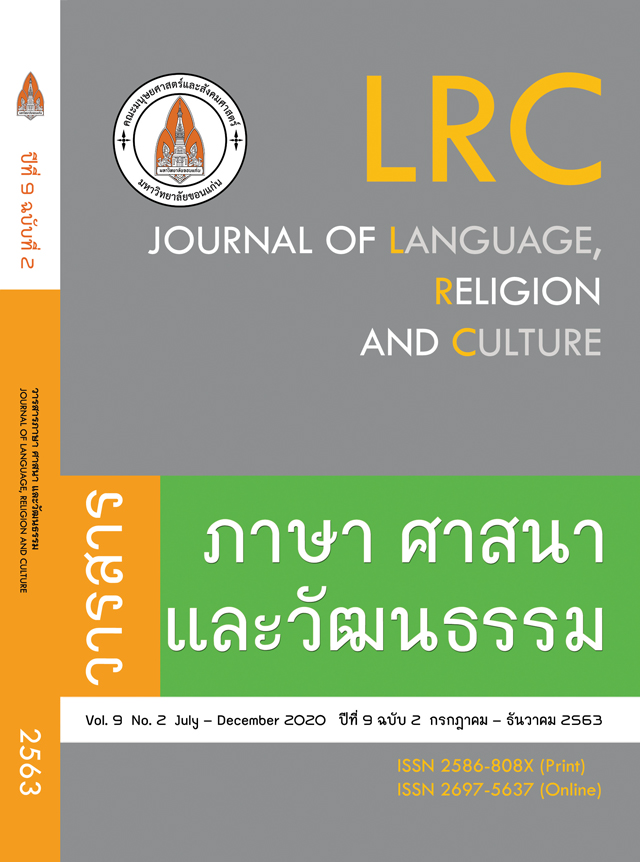ความสามารถทางด้านไวยากรณ์ในหัวข้อ Funktionsverbgefüge ของนักศึกษาวิชาเอกภาษาเยอรมัน มหาวิทยาลัยขอนแก่น
The Ability of German Majors at Khon Kaen University in Terms of the Grammatical Topic Funktionsverbgefüge
คำสำคัญ:
ความสามารถ, การทดสอบ, ไวยากรณ์เยอรมันหัวข้อ Funktionsverbgefügeบทคัดย่อ
งานวิจัยนี้มุ่งศึกษาความสามารถทางด้าน Funktionsverbgefüge ของนักศึกษาวิชาเอกภาษาเยอรมัน มหาวิทยาลัยขอนแก่น โดยเลือกศึกษาด้วยวิธีการสุ่มเฉพาะ (Purposive Sampling) ร้อยละ 50 ของนักศึกษาชั้นปีที่ 3 และ 4 สาขาวิชาเอกภาษาเยอรมัน ในปีการศึกษา 2562 (n = 33) ผู้วิจัยเลือกใช้แบบทดสอบเฉพาะ ประกอบด้วยหน่วยคำถามทั้งหมด 5 ส่วน (1. แบบทดสอบในการจับคู่หาความหมาย 2. แบบทดสอบเลือกคำกริยาให้เหมาะสมกับคำนาม 3. แบบทดสอบในการวิเคราะห์ข้อผิดพลาดทางไวยากรณ์ 4. แบบทดสอบในการปรับโครงสร้างประโยค และ 5. แบบทดสอบการถอดความและอธิบายความหมายของรูปประโยค) และเก็บข้อมูลจากการสัมภาษณ์นักศึกษาเป็นกลุ่มย่อย เพื่อเก็บข้อมูลเชิงคุณภาพ และใช้แบบสอบถามเพื่อศึกษาความคิดเห็นในเชิงปริมาณ เมื่อพิจารณาถึงความเที่ยงเชิงประจักษ์ ผลการวิเคราะห์ข้อมูลได้แสดงให้เห็นว่า ระดับความเห็นด้วยของนักศึกษาส่วนใหญ่อยู่ในระดับที่มากในหน่วยคำถามข้อที่ 1) แบบทดสอบที่ใช้เป็นแบบทดสอบที่ดีในการใช้ทดสอบนักศึกษา ( = 3.7) 2) แบบทดสอบมีความน่าสนและท้าทาย (
= 3.6) 3) แบบทดสอบมีประโยชน์และสะท้อนความสามารถของผู้สอบ (
= 3.9) 4) ระดับความยากของแบบทดสอบเหมาะสมกับนักศึกษา (
= 3.8) 5) หัวข้อ FVG มีความสำคัญสำหรับการเรียนในระดับอุดมศึกษา (
= 4.5) 6) ความรู้เรื่อง FVG จะเป็นประโยชน์ต่อการประกอบอาชีพ (
= 4.1) สำหรับหน่วยคำถาม 2 ข้อที่ระดับความเห็นด้วยของนักศึกษาอยู่ในระดับปานกลาง คือ ข้อสอบนี้ไม่ทำให้เกิดความเครียด(
= 3.5) และ หัวข้อ FVG เป็นเรื่องที่ยากสำหรับนักศึกษา (
= 3.6) ผลการวิจัยนี้นำไปสู่ข้อเสนอแนะเชิงนโยบายว่า ควรส่งเสริมความรู้ ความสามารถทางด้านภาษาเยอรมันของนักศึกษามหาวิทยาลัยขอนแก่นในหัวข้อไวยากรณ์ดังกล่าวให้มากขึ้น และสอดแทรกในรายวิชาภาษาเยอรมันระดับกลางถึงและระดับ
.สูงเพื่อให้นักศึกษาได้มีโอกาสเพิ่มพูนความรู้ในหัวข้อไวยากรณ์นี้อย่างแท้จริง
เอกสารอ้างอิง
Bailey, K.M. (1998). Learning about language assessment. Heinle Publishers.
Duden. (2006). Die Grammatik. Mannheim: Dudenverlag.
Ksieyzk, F. (2017). Kollokationsfehler als zentrales Übersetzungsproblem bei angehneden Übersetzern. In V.Janikova & J. Nalepova (Eds.) Germanistenverband der Tschechischen Republik (pp 127-140). Universität Opava: Tschechische Rebublik.
Lepš, M. (2008). Funktionsverbgefüge in der Publizistik. Diplomarbeit. Lehrstuhl für
deutsche Sprache und Literatur, Pädagogische Fakultät, Masarky-Universität, Brunn, Die Tschechische Rebublik.
Watcharakaweesilp, W. (2019). The Use of Funktionsverbgefüge in German for Thai into German Translation. Proceedings of the First International Conference on Interdisciplinary Research and Research on Language (pp. 83-90). Khon Kaen University, Thailand.







